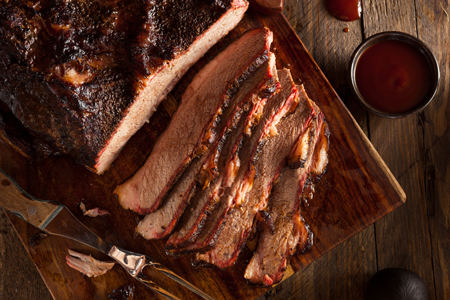Consumption of Certain Meats May Increase Risk of RCC
A new study suggests that certain mutagens formed during the cooking of meat are linked to a risk of renal cell carcinoma (RCC).
Image © Brent Hofacker / Shutterstock.com

The frequent consumption of certain types of meats could increase the risk of renal cell carcinoma (RCC), according to a study published in Cancer. While the study is not the first to find a link between meat consumption and an increased risk of kidney cancer, it is among the first to explore the mechanism of this association.
Xifeng Wu, MD, PhD, of the department of epidemiology at the University of Texas MD Anderson Cancer Center in Houston, and colleagues suggest that certain mutagens formed during the cooking of meat are linked to a risk of RCC. The risk is also modified by patient-specific gene variants.
The authors found that patients diagnosed with RCC consumed more red and white meat compared with their healthy, cancer-free counterparts. The RCC patients also consumed more cancer-associated chemicals that are produced during high heat meat-cooking techniques such as barbecuing or pan-frying. They also suggest that patients with certain gene variants are more susceptible to the deleterious and potentially cancer-causing effects of these chemicals.
In this study, the authors investigated whether intake of certain mutagens-including heterocyclic amines (HCAs) and polycyclic aromatic hydrocarbons (PAHs)-found in meat cooked at high heat may play a role in the onset of RCC.
The authors analyzed the diets and RCC genetic risk factors of 659 newly diagnosed patients and 699 healthy counterparts. Two mutagenic compounds, 2-amino-3,8-dimethylimidazo-(4,5-f) quinoxaline (MeIQx) and 2-amino-1 methyl-6-phenylimidazo(4,5-b)pyridine (PhIP), both HCAs, were found to be significantly associated with an increased risk of RCC.
Analyzing six single nucleotide polymorphisms that were previously found to be linked to RCC risk, the authors found that one of these loci was significantly associated with PhIP and RCC risk.
Diagnosis of RCC has increased in the United States and other developed nations, leading researchers to hypothesize a link between this tumor type and the Western diet, which is high in meat, processed foods, and starches. Prior studies have also found an association between consumption of meat and an increased risk of RCC, yet the mechanisms have not been studied extensively.
“The results of the current study provide additional evidence of the role of red meat, white meat, and PhIP in RCC etiology and to our knowledge is the first study of dietary intake of mutagenic compounds and RCC risk to suggest an association with MeIQx, which is one of the most abundant HCAs commonly created in the grilling, barbecuing, and pan-frying of meats at high temperatures,” wrote the authors.
Because of the small sample size and limit to Caucasian participants only, these findings need to be tested in a broader and larger population to better understand the association between RCC risk, mutagens found in cooked meat, and genetic polymorphisms.